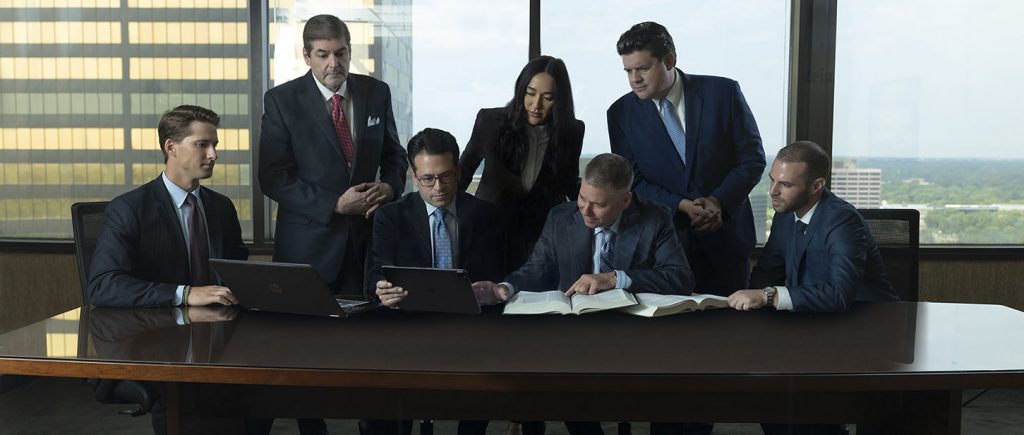Appeal Process from a Michigan Appellate Lawyer
If you were wrongfully convicted or the judge and prosecutors violated your rights, you may have a valid issue for appeal. It may be possible to have your conviction reversed and get charges dismissed.

Michigan Appellate Defense Attorneys
The appeal process in Michigan is complex and minor errors can result in a dismissed appeal and the loss of your opportunity for appellate review. Closely following each of the procedural steps helps ensure the appellate court has the opportunity to review the factual and legal issues that concern you.

These are the basic steps in filing an appeal from a criminal conviction:
The criminal appeal process in Michigan is complex and few lawyers are qualified and capable of providing a strong appeal of a criminal conviction. There is no room for errors and mistakes in an appeal. If you are going to file an appeal, you should not take chances with an inferior lawyer. Do you want to win? An experienced appellate lawyer with a reputation for success gives you your best odds of success.
1. Filing the Claim of Appeal
Within 42 days of a felony conviction, the defendant must file a Claim of Appeal with the Michigan Court of Appeals. The defendant preserves the right to appeal the conviction and sentence by filing a timely Claim of Appeal. The Claim does not have to state the basis for the appeal, merely that the defendant is taking an appeal. Along with the appeal, the defendant must file a copy of the lower court docket entries, proof that the transcripts of all of the lower court proceedings have been ordered, and the Michigan Court of Appeals filing fee (currently $375.00).
Note: Some post-judgment motions may extend the 42-day timeline, like a Motion for New Trial.
2. Order the transcripts
Contact the court reporter (or reporters) in the trial court to order the transcripts of all of the pertinent hearings, motions, the trial, and the sentencing. In Wayne County, there can be up to 10 court reporters on a case, and in Oakland and Macomb, for example, there is usually 1 or 2 per case. The court reporter will require a money deposit to begin preparing the transcripts. Once the deposit is received, they will file a notice in the Court of Appeals that the transcripts have been ordered and their expected completion date. It is the appellate attorney’s responsibility to babysit the court reporter to make sure the certificate is filed promptly.
3. Prepare and File the Brief
Fifty-six (56) days after the transcripts are filed in the Court of Appeals, the Appellant’s Brief on Appeal will be due in the Court of Appeals. The Brief on Appeal is generally a complex and law-intensive document. The more errors claimed to exist in the case, the more complex the appellate brief will be. The brief will contain all of the defendant’s legal arguments that entitle him to relief. The legal arguments are generally separated into subsections of the brief. The Michigan Court Rules dictate what the brief is to contain, how it is to be formatted and when and how it is filed. There must be a Table of Contents, an Index of Authorities, a concise statement of the questions presented, a statement of the pertinent facts, and the argument portion. It takes many years before a good criminal defense appellate lawyer can perfect a persuasive style in appellate pleadings.
4. Response to the Appellant’s Brief
Under the Michigan Court Rules, the prosecution must file its response to the Appellant’s brief within 35 days of the filing of the Appellant’s brief (absent any extensions of time which are liberally granted). Extensions can be sought by motion but are more commonly given by stipulation (agreement o the parties). If the prosecution fails to follow the appeal process in Michigan, it can lose its right to brief an issue or argue the appeal.
5. Reply to the Prosecution/Appellee Brief
The Defendant-Appellant has 21 days to reply to the arguments set forth in the prosecution’s brief from the day the reply is filed. The reply does not simply reiterate the arguments in the first brief; it is specifically meant to reply to the arguments made by the prosecution and provide law to counter any unanticipated arguments (factual or legal) that the prosecution included in its Response Brief.
6. Oral Argument Before the Court of Appeals
After all, briefs are filed, the Michigan Court of Appeals will likely schedule oral arguments. Arguments are made before a panel of 3 judges and are limited to 15 minutes. The appellate arguments are open to the general public, defendants on bond, and family members. If the defendant is in custody, he will not be allowed to attend an oral argument on the appeal. The judges will typically ask numerous questions during the argument. The questions are asked of both the defendant/appellant and the prosecution/appellee. Generally, they reflect on the issues the judges find most concerning or troubling about an issue on appeal.
7. Following the oral argument
The Court of Appeals will issue its written opinion either granting or denying the appeal (reversing the trial court or affirming the trial court, or remanding the case for clarification). The decision is almost always in writing and can take quite some time before it is completed. If the defendant wins, then the Court of Appeals, depending on what is being asked of it, will order the defendant released and the case dismissed, grant a new trial, or remand the case to the trial court for resentencing. The prosecution has a limited time to request an appeal before the Michigan Supreme Court. If the defendant is in custody, they will generally stay in custody pending whether the additional appeal is filed. If the ruling favors the prosecution/appellee, the defendant can then request an appeal before the Michigan Supreme Court.

Michigan Appellate Defense Counsel – The Appeal Process in Michigan
Handing appeals from convictions in circuit and district courts in Oakland County, Macomb County, Wayne County, Washtenaw County, Livingston County, and throughout Michigan. If you still have questions for a Michigan criminal defense attorney, please call LEWIS & DICKSTEIN, P.L.L.C. for a free consultation and confidential case evaluation.
Call us today at (248) 263-6800 for a free consultation or complete a Request for Assistance Form. We will contact you promptly and find a way to help you.

